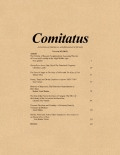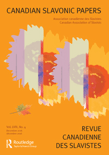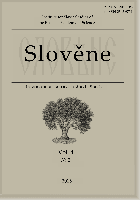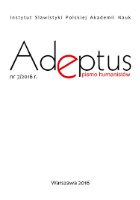
Studia Slavica et Balcanica Petropolitana
metrics 2024
Connecting Cultures: A Gateway to Slavic and Balkan Scholarship
Introduction
Studia Slavica et Balcanica Petropolitana is an esteemed open-access journal, published by the Department of History at St. Petersburg State University, focusing on interdisciplinary research within the fields of Slavic and Balkan studies. Since its inception in 2007, the journal has made significant contributions to the academic discourse surrounding historical and contemporary issues pertinent to these regions, thus achieving a strong reputation among scholars. As of 2023, it is categorized in the Q2 quartile for History, ranked 873 out of 1760 in the arts and humanities segment, highlighting its impactful scholarly contributions. The journal operates out of Russia, with its editorial office located at Mendeleevskaya Liniya in St. Petersburg. Its accessible publishing model promotes widespread dissemination of knowledge, making it an invaluable resource for researchers, professionals, and students who aim to deepen their understanding of Slavic and Balkan societies from both historical and modern perspectives.
Metrics 2024
 0.18
0.18 -
- 0.10
0.10 5
5Metrics History
Rank 2024
Scopus
IF (Web Of Science)
JCI (Web Of Science)
Quartile History
Similar Journals

COMITATUS-A JOURNAL OF MEDIEVAL AND RENAISSANCE STUDIES
Fostering Dialogue on Cultural Phenomena of the PastCOMITATUS: A Journal of Medieval and Renaissance Studies, published by the University of California Center for Medieval and Renaissance Studies, serves as a critical platform for exploring the complexities of medieval and Renaissance eras through diverse scholarly lenses. With an ISSN of 0069-6412 and a dedicated E-ISSN of 1557-0290, this journal operates primarily in the United States, delivering rigorous academic discourse aimed at historians, literary critics, and art scholars alike. Although currently classified in the Q4 category within its fields in 2023, including History, Literature and Literary Theory, and Visual Arts and Performing Arts, COMITATUS invites submissions that challenge prevailing narratives and introduce innovative perspectives on cultural phenomena. It has been publishing since 2002 with periods of convergence spanning from 2002 to 2009, and from 2017 to 2023. The journal's commitment to open dialogue and research dissemination makes it an essential resource for students, professionals, and researchers interested in medieval and Renaissance studies, fostering a deeper understanding of these pivotal historical periods.

ZEITSCHRIFT FUR SLAVISCHE PHILOLOGIE
Pioneering Research in Slavonic LinguisticsZEITSCHRIFT FUR SLAVISCHE PHILOLOGIE is a pivotal journal in the field of Slavonic philology, published by Universitatsverlag C Winter Heidelberg GmbH. Renowned for its scholarly rigor and insightful contributions, this journal serves as a key platform for researchers, professionals, and students interested in Slavic languages and linguistics. Despite its classification as a traditional subscription journal, it has maintained a consistent presence in the academic community with contributions that enhance understanding of linguistic, cultural, and literary studies within the Slavic context. With an H-index reflecting its impact and relevance, the journal has historically been indexed in Scopus, ranking in the 34th and 33rd percentiles within the Arts and Humanities and Social Sciences categories, respectively. The journal has featured a range of scholarly articles from 2002 to 2017, providing a rich repository of knowledge for those dedicated to the study of Slavic languages. For any researcher aiming to delve into this dynamic field, ZEITSCHRIFT FUR SLAVISCHE PHILOLOGIE remains an essential resource.

Slavia Meridionalis
Unveiling new perspectives in Slavic academic discourse.Slavia Meridionalis is a distinguished open-access journal published by the Polish Academy of Sciences, Institute of Slavic Studies, dedicated to advancing scholarly discourse in the fields of Anthropology, Cultural Studies, History, Linguistics and Language, and Literature and Literary Theory. With its ISSN 1233-6173 and E-ISSN 2392-2400, this journal has made significant strides in promoting research since its inception in 2014. Operating from Warsaw, Poland, Slavia Meridionalis aims to serve as a pivotal platform for researchers and students alike, fostering interdisciplinary collaboration and knowledge dissemination. The journal holds respectable rankings in its various categories, some achieving Q3 status, which reflects its commitment to quality scholarship within the academic community. By providing open access to its readership, Slavia Meridionalis ensures that pivotal research is readily available for the global audience, thus enhancing its relevance and impact across diverse fields.

Canadian Slavonic Papers
Fostering Dialogue Across Slavic StudiesCanadian Slavonic Papers, published by Routledge Journals, Taylor & Francis Ltd, is an esteemed peer-reviewed journal dedicated to the exploration of the Slavic, Eastern European, and Russian domains, fostering scholarly dialogue across multiple disciplines. With a robust focus on Cultural Studies, History, Linguistics, and Literature, this journal has firmly established its presence in the academic community, as evidenced by its Q1 ranking across various categories in 2023. Since its inception, Canadian Slavonic Papers has been a vital platform for researchers, professionals, and students alike, providing an invaluable repository of knowledge and insights from 1977 to the present. While not an open-access journal, it remains accessible through institutional subscriptions, ensuring a wide dissemination of scholarship. Located in the United Kingdom, the journal continues to contribute significantly to the understanding of Slavic studies within a global context, making it essential reading for anyone invested in this dynamic field.

Palaeobulgarica-Starobalgaristika
Unveiling the Depths of Bulgaria's PastPalaeobulgarica-Starobalgaristika is a distinguished academic journal published by the Bulgarian Academy of Sciences, focusing on the rich history and cultural heritage of Bulgaria and the surrounding regions. With an ISSN of 0204-4021 and an E-ISSN of 2603-2899, this journal serves as an essential platform for researchers, historians, and scholars, providing a forum for the dissemination of innovative research and interdisciplinary studies. The journal has established its significance in the field by achieving an impressive Q3 ranking in History and boasting a Scopus rank of #702 out of 1760 in the Arts and Humanities category, placing it in the 60th percentile. Operating within the timeline of 2019 to 2024, it strives to explore various facets of Bulgarian history, cultural identity, and archaeological findings. While currently not an open-access journal, Palaeobulgarica-Starobalgaristika remains committed to enhancing the academic conversation within its field, making it an invaluable resource for those dedicated to understanding and preserving Bulgaria's historical narrative.

Slovene-International Journal of Slavic Studies
Illuminating the Rich Tapestry of Slavic ScholarshipThe Slovene-International Journal of Slavic Studies, published by the Russian Academy of Sciences, Institute of Slavic Studies, serves as a vital platform for scholarly discourse in the fields of Cultural Studies, History, Linguistics, and Religious Studies. Since its transition to Open Access in 2012, the journal has enriched academic dialogue, enabling wider circulation and accessibility of research findings. Based in the Russian Federation, the journal supports interdisciplinary approaches, inviting contributions that push the boundaries of traditional Slavic studies. With a commendable ranking in the Q3 quartile across multiple categories as of 2023 and respectable Scopus rankings, it stands out as a crucial resource for researchers and students alike, enhancing their understanding of Slavic and related cultural contexts. The journal's commitment to fostering international collaboration and dialogue positions it as an invaluable asset for anyone engaged in the complexities of Slavic studies.

Adeptus
Advancing Slavic Studies Through Open DialogueAdeptus is a pioneering open-access journal published by the Polish Academy of Sciences, Institute of Slavic Studies, specializing in Slavic studies and cultural research. Since its inception in 2014, the journal has aimed to foster scholarly dialogue and advance knowledge across various disciplines related to Slavic languages, literature, history, and sociology. With an ISSN of 2300-0783, Adeptus has positioned itself as a vital resource for researchers, professionals, and students engaged in Slavic studies, offering a platform for high-quality, peer-reviewed articles that explore diverse topics within the field. The journal's open-access model promotes accessibility and dissemination of knowledge, making it a significant contributor to the academic landscape. Located in Warsaw, Poland, Adeptus continues to thrive as a key outlet for innovative research, inviting submissions that embody rigorous scholarship and insightful perspectives.

Zolotoordynskoe Obozrenie-Golden Horde Review
Advancing Historical Insights from Central AsiaZolotoordynskoe Obozrenie-Golden Horde Review is a distinguished journal published by the AKAD NAUK RESPUBLIKI TATARSTAN, INST ISTORII IMENI SHIGABUTDINA MARDZHANI, focusing on the rich historical narratives and cultural heritage surrounding the Golden Horde and broader Central Asia. With an ISSN of 2308-152X and E-ISSN 2313-6197, this open-access journal has been a platform for scholarly dissemination since its inception in 2013, allowing researchers and academics to freely engage with its content. Ranking in the top quartile (Q1) in the field of History as of 2023, and holding a Scopus rank of 865 out of 1760 in Arts and Humanities, it has carved out a significant niche within historical scholarship. The journal's aims include promoting innovative research and fostering academic dialogue on historical themes, making it an invaluable resource for historians, students, and professionals alike. Operating from Kazan, Russia, Zolotoordynskoe Obozrenie is committed to advancing knowledge on the complexities of history and culture in the region through rigorous peer-reviewed articles, reviews, and conference proceedings.

Slovo
Navigating the Dynamic Landscapes of Slavic ScholarshipSlovo, published by the University College London, School of Slavonic & East European Studies, is a vital scholarly journal dedicated to the exploration of Slavic languages and cultures, as well as the broader social sciences and humanities. Established with a commitment to advancing academic discourse, Slovo serves as a platform for researchers, professionals, and students interested in the dynamic intersections of literature, history, and cultural studies within Slavic and Eastern European contexts. Although it holds a Q4 ranking in both the Arts and Humanities and Social Sciences categories, the journal’s emphasis on fresh perspectives often invites innovative contributions that challenge conventional narratives. While lacking an Open Access option, Slovo remains integral for those seeking to navigate its multifaceted terrain, ensuring that emerging scholars and established academics alike can engage with rigorous research from 2012 to 2023 and beyond. With its headquarters in London, United Kingdom, this journal not only reflects the rich heritage of its academic lineage but also fosters a vibrant community committed to the exploration of Slavic and East European studies.

Radovi Instituta za Povijest Umjetnosti-Journal of the Institute of Art History
Connecting Researchers to the Heart of Art Analysis.Radovi Instituta za Povijest Umjetnosti-Journal of the Institute of Art History is a distinguished academic journal dedicated to the exploration and critical analysis of art history, with a special emphasis on the visual arts and performing arts. Published by INST POVIJEST UMJETNOSTI-INST ART HISTORY in Croatia, this journal provides an essential platform for researchers and practitioners to disseminate their findings and engage in scholarly discourse. Since its transition to Open Access in 2008, it has significantly increased the accessibility of its content, fostering a global exchange of ideas. The journal is indexed in notable databases, reflecting its impact within its field, with a current ranking that places it in the Q4 category for History and in Q3 for Visual Arts and Performing Arts. As it spans its converged years from 2015 to 2024, Radovi is poised to expand its influence and continue contributing to the understanding of art historical narratives. Researchers, professionals, and students alike will find this journal a valuable resource for contemporary discussions and theoretical advancements in the study of art.